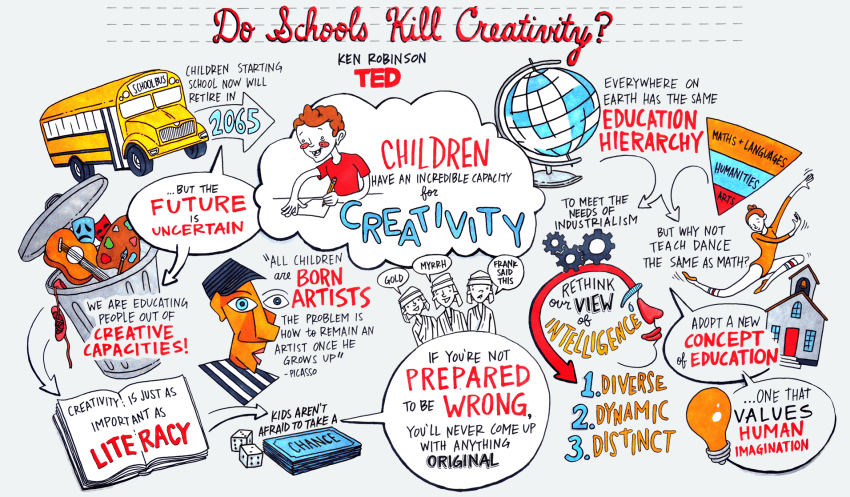Educational institutions in Pakistan are killing the creativity of students by discouraging idiosyncrasy. The youth are deprived of originality and ability to think out-of-the-box. From curriculum to conduct, almost everything practiced at school only serves to make students a human-machine.
Memory determines the future of a student, because all kinds of examinations and entry tests are based on the ability to retain and subsequently regurgitate information. Only crammers and rote learners achieve high grades. Today’s so called high-achievers are unable to contribute as they are only trained to do as learned. They simply memorize to obtain higher grades and once examinations are finished, everything is forgotten. Students are forced to copy lectures just as a patient must take medicine to get well.
The curriculum taught in Pakistani schools grades the subjects; medical and engineering are ranked A and B respectively whereas Humanities stand at C. Students are made to think that they are the best if they study medical or engineering and the rest of the disciplines are domains of the least intelligent ones. A vast majority of the institutions don’t offer classes in music, dance and fine arts, and where available, they carry little worth. Our syllabi give no opportunity to questioning.
Mornings are full of frustration and hastiness for children. The kids’ day gets a nervous, noisy and forced start with the utterly tiresome journey to school. Heavy bags, traffic jams and terrifying honking of horns’ are a few factors, which exhaust the children well before they enter the school. Once on the campus, the sacred act of conducting the morning assembly, notwithstanding the weather conditions, further adds to their misery. The mandatory morning gatherings are packed with boring speeches and ritual they have to attend to or perform standing in the middle of the ground.
Classes are divided into sections based on students’ showing in the entry tests. The high scorers are segregated from those performing lower in the examination. Yes, the one designed to test the memory of a student, not his intellect and originality. Instead of helping, age factor works against a creative student’s progression. Schools do not acknowledge that anyone can sit in a higher grade at a younger age as if it’s equivalent to seeking a driving licence or buying a cigarette. (Ironically for smoking and driving, age restriction does not apply quite usually!)
An average classroom resembles a jail where no one except the teacher does as he wants. The students cannot even sigh, sneeze or cough freely. Asking a searching question is prohibited, and one who raises a different query is labelled a nuisance. Novelty, the essence of creativity, is a crime in a classroom. Students can only ask bookish questions whenever permitted. The seating plan is devised in a way that the students who can memorize all the lectures and books sit on the front desks for they are ranked as the most intelligent ones.
The teacher has to keep a grin face, maintain physical and psychological distance lest pupils share their interests and be creative. Original thinking is a crime, because only the answer given at the end of the book or dictated by the teacher is the only correct one. Chances of participation are only given to those who always won’t err. Most of the teachers bring notes in the class because they don’t know the concept or won’t trouble themselves with different examples or method. The teaching community inculcates the same in the minds of the children i.e. every answer that goes against what is taught is a mere distraction. Many won’t let children learn from the Internet due to the insecurity of being exposed and outsmarted by the pupils.
Factories and schools are hard to distinguish. The quality control department of school is responsible to check the nails, uniform, socks and haircut of their product. Similarly, a factory’s quality control department assures compliance of various benchmarks for the product prior distribution. The schools overlook if and how they impact the children’s behaviour and ambition. Thanks to widespread commercialism, they publicize the achievements of the graduating batch by hanging posters of star performers in examinations, lauding their passing rates. Rarely does a school initiate a publicity campaign to promote a student’s art, innovation or social service.
Creativity cannot be approved, checked or memorized, it is that uniqueness, novelty and interest which always tries to come out spontaneously. It is an expression of mind and heart devoid of confinements and shackles. Our schools are focused on inculcating information, manners and discipline. Decision makers can’t be produced by sharing mere information. Critical thinking and creativity plays a fundamental role in making leaders, who could realize the situation and elevate the nation.
Winston Churchill, former Prime Minister of England, was one of such neglected yet creative students. In his autobiography My Early Life, the legendary politician shares that he couldn’t learn during 12 years at the school. Churchill calls his time at school ‘‘a hateful servitude . . . where my reason, imagination or interest were not engaged.”
Harrow School London remarked about Churchill: ‘’He is so regular in his irregularity that I really don’t know what to do. He had such good abilities but these would be made useless by habitual negligence. Constantly late for school, losing his books and papers and various other things.” (School Reports Of The Great And The Good, edited by Catherine Hurley (Simon & Schuster).
Failing, remaining under-employed or just bursting out to prominence due to the power of the talent are some of the destinations of the students who can’t cope with run-of-the-mill standards of the contemporary crippled education system.
The prevailing ill-prepared teaching methodology needs to be reformed. Reasoning, critical thinking and originality can only facilitate learning. The forthcoming youth won’t tolerate the current outdated and unsuccessful model of education. Storage devices are both cheap and highly efficient of saving information, hence cognitive development should be the essence of teaching. Children should be allowed to follow their interests. Let sanity prevail, imagination, innovation, and reasoning can facilitate our next generation’s prosperity.
Sir Kenneth Robinson, British Author, concluded in his research that 98% children are highly creative when joining kindergarten but afterwards in school, their creativity rapidly declines. Examinations should consist of questions, which involve the interest of the student, and all the candidates mustn’t be evaluated by preparing a single paper; every individual should be tested according to their interest. Online schooling should be promoted as it not only reduces the cost but saves students from a hectic routine as well.














